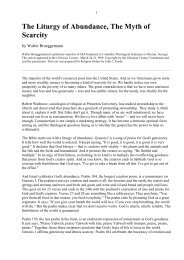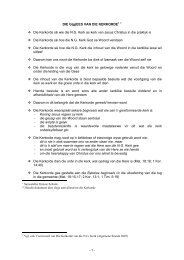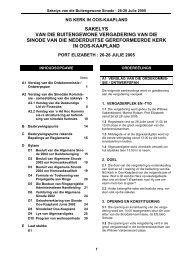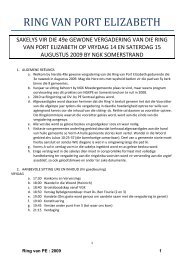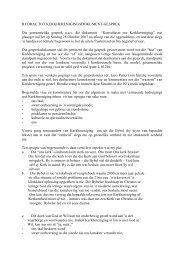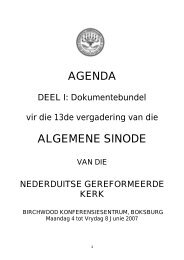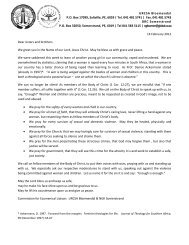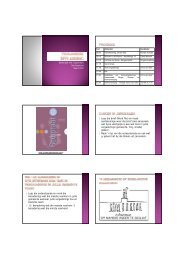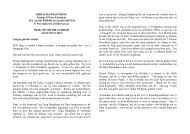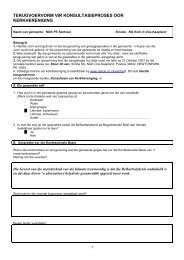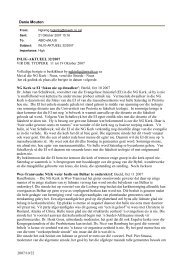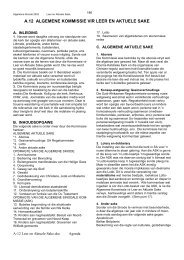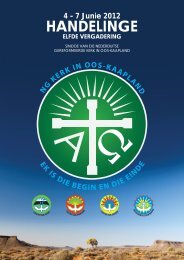BelharBelydenis - NG Kerk in Oos-Kaapland
BelharBelydenis - NG Kerk in Oos-Kaapland
BelharBelydenis - NG Kerk in Oos-Kaapland
Create successful ePaper yourself
Turn your PDF publications into a flip-book with our unique Google optimized e-Paper software.
Artikel 5<br />
Ef 4:15-16; Hand 5:29-33; 1 Pet 2:18-25; 1<br />
Pet 3:15-18<br />
Ons glo dat die kerk geroep word om dit<br />
alles te bely en te doen, <strong>in</strong><br />
gehoorsaamheid aan Jesus Christus sy<br />
enigste Hoof, al sou ook die owerhede en<br />
verorden<strong>in</strong>ge van mense daarteen wees<br />
en al sou straf en lyd<strong>in</strong>g daaraan<br />
verbonde wees.<br />
Die belydenis sluit af: Die kerk moet nou<br />
alles bevestig deur woord (bely) en daad<br />
(doen). Dis wat navolg<strong>in</strong>g en<br />
gehoorsaamheid aan Jesus Christus vra.<br />
Wie egter opstaan vir die d<strong>in</strong>ge wat Belhar<br />
bely - eenheid, versoen<strong>in</strong>g en geregtigheid -<br />
kan moeilikheid verwag. Die owerhede<br />
(mense <strong>in</strong> beheer) en verorden<strong>in</strong>ge van<br />
mense mag dié wat vir die waarheid van die<br />
evangelie staan, straf en laat ly. In baie<br />
situasies vandag word die ware evangelie<br />
verdruk, heers daar nog verdeeldheid en<br />
onreg, en word christene vervolg.<br />
Die kerk staan egter net onder een Hoof,<br />
Jesus Christus, uit wie die hele liggaam<br />
groei (Efe 4:15-16). Soos die apostels van<br />
ouds mag dit van die kerk gevra word om te<br />
sê: “ ‘n Mens moet eerder aan God<br />
gehoorsaam wees as aan die mense!”<br />
(Hand 5:29). Christene moet hul optrede<br />
kan verduidelik (1 Pet 3:15). As daar dan<br />
straf en lyd<strong>in</strong>g (of ignorer<strong>in</strong>g) volg, getuig<br />
Petrus: “Dit is genade as iemand die pyn<br />
van onverdiende lyd<strong>in</strong>g verduur omdat hy<br />
aan God getrou wil wees” (1 Pet 2:19).<br />
Jesus is die Heer.<br />
Hierdie oerbelydenis uit die heel eerste<br />
gemeentes was ‘n duidelike protes teen die<br />
verer<strong>in</strong>g van die keiser <strong>in</strong> die Rome<strong>in</strong>se ryk.<br />
Dit was ‘n toewyd<strong>in</strong>g aan die Heer-skap van<br />
Jesus alleen. Talle christene is hieroor ter<br />
dood veroordeel. Teenoor alle magte en<br />
owerhede en stelsels – ook die kragte van<br />
globaliser<strong>in</strong>g - bely die kerk vandag steeds:<br />
Ons staan onder een Here, Jesus Christus.<br />
Aan dié enige God, Vader, Seun en<br />
Heilige Gees, kom toe eer en heerlikheid<br />
<strong>in</strong> ewigheid.<br />
Die belydenis e<strong>in</strong>dig soos dit beg<strong>in</strong> het: By<br />
die Drie-Enige God. Aan hierdie God word<br />
– soos met die slotwoorde van die Onse<br />
Vader – lof en heerlikheid toegebr<strong>in</strong>g. Met<br />
die woorde <strong>in</strong> ewigheid strek die belydenis<br />
as roemende kerk uit na “die lewe van die<br />
toekomstige eeu” (Nicea).<br />
Belydenis van Belhar ● Belhar Confession ● Isivumo SaseBelhar<br />
Article 5<br />
Eph 4:15-16; Acts 5:29-33; 1 Pt 2:18-25; 1<br />
Pt 3:15-18<br />
We believe that, <strong>in</strong> obedience to Jesus<br />
Christ, its only Head, the Church is called<br />
to confess and to do all these th<strong>in</strong>gs,<br />
even though the authorities and human<br />
laws might forbid them and punishment<br />
and suffer<strong>in</strong>g be the consequence.<br />
The confession concludes: The church must<br />
now confirm all this through word (confess)<br />
and deed (do). This is what follow<strong>in</strong>g and<br />
obey<strong>in</strong>g Jesus Christ means. However,<br />
they who stand up for what Belhar<br />
confesses – unity, reconciliation and justice<br />
– can expect trouble. The authorities<br />
(people <strong>in</strong> control) and human laws may let<br />
those who stand for the truth of the Gospel,<br />
be punished and have them suffer. In many<br />
situations today the true gospel is<br />
oppressed, discord and <strong>in</strong>justice reign and<br />
Christians are persecuted.<br />
However, only one Head rules the church,<br />
namely Jesus Christ and from Him the<br />
whole body grows (Eph 4:15 -–16). As with<br />
the apostles from long ago the church may<br />
be asked to say: “We ought to obey God<br />
rather than men!” (Acts 5:29). Christians<br />
should be able to expla<strong>in</strong> their conduct (1 Pt<br />
3:15). If one then endures punishment and<br />
suffer<strong>in</strong>g (or is ignored), Paul testifies: “But<br />
when you do good and suffer, if you take it<br />
patiently, this is commendable before God”<br />
(1 Pt 2:19).<br />
Jesus is Lord.<br />
This ancient confession from the very first<br />
congregations was a clear protest aga<strong>in</strong>st<br />
the worshipp<strong>in</strong>g of the emperor of the<br />
Roman Empire. This was dedicated to the<br />
Lord-ship of Jesus alone. Many Christians<br />
were condemned to death because of this.<br />
Aga<strong>in</strong>st all powers and authorities and<br />
systems – also the forces of globalisation –<br />
the church still has to testify today: one<br />
Lord, Jesus Christ, rules us.<br />
To the one and only God, Father, Son<br />
and Holy Spirit, be the honour and the<br />
glory forever and ever.<br />
The confession ends as it began: with the<br />
Triune God. To this God – as the f<strong>in</strong>al<br />
words of the Model Prayer say – the power<br />
and glory forever. With the word forever,<br />
the confession reaches out to “the life of the<br />
world to come” (Nicea).<br />
16<br />
Isiqendu 5<br />
Kwabase Efese 4:15-16; iZenzo 5:29-33; 1<br />
Pet.2:18-25; 1 Pet. 3:15-18<br />
Siyakholwa ukuba iCawe iyabizwa<br />
ukukuvuma nokukwenza konke oku,<br />
imthobela uYesu Krestu oyeyona Ntloko<br />
yayo, nokuba kuyachaswa<br />
ngabasemagunyeni nayiyimimiselo yabantu,<br />
kananjalo nokuba okuvumayo nokwenza<br />
oku ezibizela isohlwayo nembandezelo.<br />
Isivumo-likholo sivala: ICawe kufuneka ngoku<br />
konke ikomeleze ngelizwi (ukungq<strong>in</strong>a)<br />
nangezenzo (ukwenza) Koko okufunwa<br />
kubalandeli nokuphula-phula uYesu Krestu.<br />
Lowo uchasana noko kuvunywa sisivumo<br />
saseBelhar –ubunye, uxoleleniso, kunye<br />
nobulungisa- angadibana nenkathazo.<br />
Izirhulumente (abantu abakulawulo) kunye<br />
nemimiselo yabantu z<strong>in</strong>okuc<strong>in</strong>ezela zohlwaye<br />
abo bamele <strong>in</strong>yaniso kunye neVangeli.<br />
Kwiimeko ez<strong>in</strong><strong>in</strong>zi kule mihla iVangeli yenene<br />
iyac<strong>in</strong>ezelwa, kusekho iyantlukwano kwakunye<br />
nentselo-bulungisa kwaye namaKrestu<br />
asatshutshiswa.<br />
ICawe iphantsi kweNtloko enye, uYesu Krestu,<br />
apho umzimba uwonke okhula kuyo (Efese 4:<br />
15-16) NjengabaPostile bamandulo,<br />
kunokufunwa nanjalo kwiCawe, kuthiwe:<br />
“simelwe kukuthi sive uThixo kunokuba sive<br />
abantu” (iZenzo 5:29). AmaKrestu kufuneka<br />
abonakalise ngokucacileyo izenzo zawo (1 Pet.<br />
3:5) Xa kunokulandelwa isohlwayo kunye<br />
neentlungu (ukungahoyi) ungq<strong>in</strong>a atsho uPetros<br />
“Kuba oku kuyabuleleka, ukuba umntu uthwala<br />
<strong>in</strong>tsizi, ngenxa yokumazi uThixo eve ubunzima<br />
esoniwa” (1 Pet. 2:19)<br />
UYesu uyiNkosi<br />
Esi sivumo sakudala samabandla okuqala,<br />
yay<strong>in</strong>dlela yokuchasa uzukiso lukaKaiser<br />
kubukumkani bamaRoma. Yayikukuz<strong>in</strong>ikela<br />
kubuThixo bukaYesu yedwa. Un<strong>in</strong>zi<br />
lwamaKrestu lwagwetyelwa ukufa malunga<br />
noku. Kuwo onke amagunya nezirhulumente<br />
neenkqubo –kunye namandla ehlabathi<br />
(globalization) –isangq<strong>in</strong>a iCawe unanamhla<br />
ukuthi: Sime phantsi kweNkosi enye, uYesu<br />
Krestu.<br />
KuThixo emnye, uYise nonyana noMoya<br />
oyiNgcwele, makube ludumo<br />
nobungangamsha ngonaphakade<br />
kanaphakade.<br />
Isivumo sigqibela njengokuba besiqalisa:<br />
kuThixo oziqu zithathu emnye. Kulo Thixo –<br />
njengamazwi avalayo kuBawo wethu<br />
oseZulw<strong>in</strong>i- kuzisa udumo nozuko. Ngala mazwi<br />
ngonaphakade kanaphakade siq<strong>in</strong>isekisa<br />
isivumo njengeCawe ezukisiweyo ukuya<br />
“kubomi benkulungwane ezayo” (Nicea).



